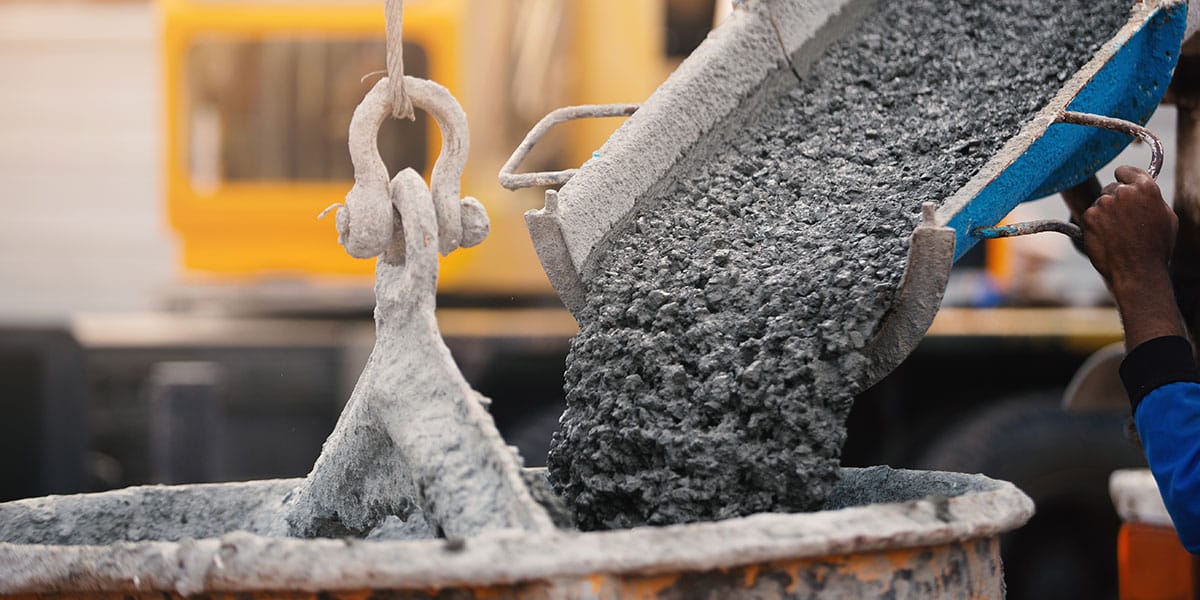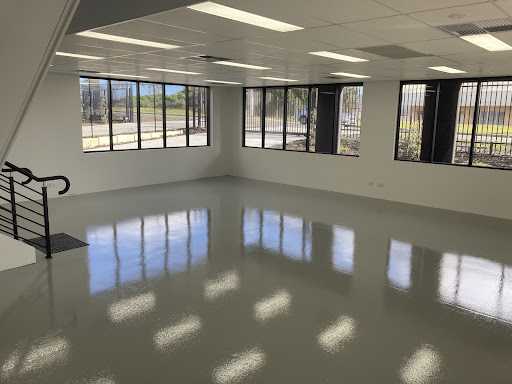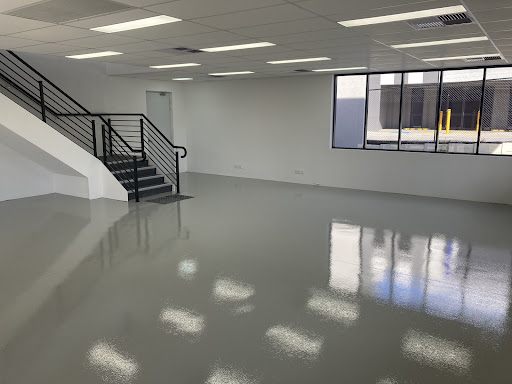Concrete Sealing Perth
2-Year Warranty On Commercial And 5-Year Warranty On Residential Projects.
One Concrete Sealing Service Can Extend The Life of Your Concrete For Years (Or Decades)
We preserve and fade-proof your concrete in Perth with PM Industries solutions. Our team of experienced professionals uses the latest methods and best concrete sealer to ensure driveways, patios, and paths stay looking great for longer, even when under attack from the harsh climates of Australia.
Our sealants provide a protective barrier that reduces the penetration of water, dust, oil, and debris — protecting your extreme duty floor against cracking, fading, UV rays and general degeneration. This not only adds to the life of your concrete, it also adds beauty and ease of maintenance.
With our work you’ll get a beautiful, easy-to-clean, maintenance-free and durable concrete garden area that will increase your home’s value. Count on us for quality concrete work.
How do I know if I need your concrete sealed?
Here are some key indicators:
- Cracks and Erosion: Cracks, pitting or surface wear-and-tear on your concrete is indicative of moisture and other factors damaging your concrete.
- Spots: Persistent spots and stains from oil, grease or other contaminants are a telltale sign that your concrete is porous and needs to be sealed.
- Colour Fading: Peeling and fading of the color is possible if the concrete slab is in direct sunlight. Sealed to protect them their natural colour and from UV.
- Penetration of Water: If water readily penetrates your concrete instead of beading on top, it’s time to seal to keep out moisture.
- Maintenance: If you’re always cleaning and maintaining your concrete then sealing can help reduce the time you spend taking care of it.
A professional concrete service can evaluate your individual circumstances and advise you on the best action to take.
Free Quotes Within 48 Hours

What factors affect the concrete sealing cost?
Cost can range significantly based on numerous factors such as location of the area to be sealed, type and condition of the concrete, type of sealer used & services performed by contractor.
Here are some cost-influencing factors:
1. Size of the Space: The bigger an area, the more expensive it will be to seal.
2. The Condition of the Concrete: If your concrete is dirty, stained and or damaged in some way and needs to be cleaned and/or repaired before sealing can commence will increase the cost.
3. Type of Sealant: There is a specific sealant for sealing driveways and they may be priced differently. While you may be paying more for the costlier sealants on the high end of our range, you are also getting more protection.
4. Additional Services: Some installers offer additional services for pressure washing, crack repair and decorative finishes that can also add to the cost.
5. Average Labour Cost: The average cost to hire a contractor ranges from £500-£600, while it also depends on Number of Hours and Operatives required and as such multiple quotes are recommended to find the best price.
How long does concrete sealing take?
How long it takes to complete sealing project can vary in weeks, depending on a number of factors like the size and condition of your concrete; kind of sealant used; weather. On average, the sealing process takes one to three days but you should allocate additional time for your driveway to cure.
Here’s a back of the envelope calculation for when it might happen:
- Prep: Diamond grind and clean the concrete. Dirt. All residue sealants from previous treatment are to be cleared. Depending on the size and condition of the area, this process can take hours or even days.
- Drying Time: After cleaning the concrete needs to dry completely before sealing. This can take anywhere from a few hours to a whole day, depending on weather conditions and how porous your concrete is.
- Sealing Application: The actual application of the sealant generally takes a few hours, including the time spent putting down multiple coats as necessary. You will also have to wait until whichever type of sealer you’re using dries before proceeding to next step.
- Drying and Curing: After applying the sealant, it has to cure and dry properly. This can take from 24to72 hours, depending on which substance is being used and the environment that surrounds it.
- Final Inspection: Once the sealant has cured, a final inspection is carried out to check that everything is all sealed up properly, including how it looks.
It ought to be noted that unfavourable climatic conditions, such as rain or high humidity, will add time to the drying and curing times.
How can I identify professional concrete sealer?
Choosing A Professional Concrete Company: Choosing the best concrete service can be difficult, but there’re some hints that you must consider (and remember).
This is how you can tell a pro:
- Licensed and Insured: Make sure the contractor is licensed to carry out concrete sealing in Perth with adequate insurance. This guarantees that they are legally up to standard and can offer some financial protection should an accident occur.
- Specialist: Use a specialist in Asphalt Maintenance, often these contractors have the knowledge and equipment necessary to perform the job.
- Local Conditions: A good contractor would be aware of the particular weather and environmental conditions in Perth, & as such will advise on specific sealants that best fit the local climate.
- Quality Products: Ask them about the sealants and products they are going to use. The professionals have access to better quality sealants which will offer more protection.
- Fair Pricing: Always ask for an itemized, written quote from which you are able to see the work that is to be done together with a breakdown of materials and labor fees ( as well as any costs). Avoid contractors who offer ambiguous or unrealistically low bids.
- Professional Tools: A trusted installer will have access to professional tools for preping and sealing the concrete.
Warranty or - Guarantee: Ask if the contractor has any warranty or guarantee on their performance. You want a good contractor with some warrantee on their service.
- Communication: Effective communication is crucial. An ethical contractor should be able to communicate with you, answer your questions clearly, and explain the sealing process.
- Contract: The key to a successful project is always have an agreement in writing and clearly state everything, scope of work, timeline, payment schedule and any warranties or guarantees.
If you consider these things and do some research, you will be able to find a professional concrete service in Perth that is right for your job and get the project done properly.
Frequently Asked Questions About Concrete Sealing in Perth
Is concrete sealing worth it?
Depending on the situation and taste, sealing would probably be worth it to a good many homeowners:
1. Weather: Perth is a mediterranean climate and UWA Aviation can fly 365 days a year. The sealant can serve as a guard for your surfaces from the sun and those harmful UV rays, which are so often damaging to surfaces in general, while also preventing any damage that could come with rain in addition to staining or cracking and fading. If you value concrete that looks good as long as possible, it’s worthwhile to spring for sealer.
2. Durability: Sealing can help extend the life of your concrete by stopping moisture damage, minimising spalling/cracking and resisting surface wear. Sealing Sealing can give your concrete a longer life.
3. Maintenance: Sealed concrete floors are also easy to maintain. Resistance to staining from oil, grease and other common substances makes it low maintenance. If you want to save cleaning and maintenance time, sealing is helpful.
4. Aesthetics: Sealing can make your concrete look more beautiful, restoring the natural colour and offering a glossy finish if you choose. It can also shield decorative or stamped concrete designs. If you care about your concrete looking its best, sealing can be worthwhile.
5. Property Value: Clean concrete looks better and increases the value of your home or business. Sealing is an investment if you’re fixing up your house to sell or rent, whether you make that back in the value selling price of increased rent payments.
6. Cost: Although there is a cost associated with sealing the surface, it will generally be less than replacing concrete that was damaged prematurely. There is a potential for savings in maintenance and replacement costs over time that could make sealing economically worthwhile.
7. It really does boil down to preference: Personally, it is not worth the sealing. It is worth a splurge if you care about the looks, lifespan, and minimal maintenance of your concrete.
Before you make a decision, you should talk to a professional concrete service in Perth. They could evaluate the state of your concrete surfaces, quote you a price and personalise recommendations to satisfy your needs and budget.
What happens if you don't seal concrete?
If you decide not to seal your concrete surfaces a number of problems and unintended consequences can occur, such as:
- Water Penetration: Since unsealed concrete is porous, water can infiltrate from rain or from underground sources. This moisture can cause many issues including efflorescence (a white, powdery deposit that forms on the surface as a result of water evaporation), freeze-thaw damage and the development of mold and mildew.
- Staining and Discolouration: Because uncoated concrete is more porous, it’s more likely to become stained when exposed to oil, grease, rust, or chemicals. These spills are hard to clean and would spoil the concrete look.
- Cracking and Surface Wear: Exposed to the elements, concrete is more susceptible to cracking, spall (surface flakiness), and wear. And this gets exacerbated by the concrete expanding and contracting with temperature variability, plus having moisture hit it.
- Fading and UV Damage: Unsealed concrete can fade with extended exposure to sunlight. This can and do have a weathered look.
- Decreased Durability: Unprotected concrete is susceptible to wear and tear, this means it will have a lesser lifespan. Such buildups can result in costly repairs or concrete replacement.
- Higher Maintenance: Unsealed concretes tend to need a lot more cleaning and attention for stains, surface problems, as well as moisture issues.
- Reduced Curb Appeal: The concrete that is not sealed may begin to look aged or worn, which can compromise the beauty of your home. Well, this might be an issue if you care about the outward appearance of your residence or place of business.
By doing schools and services you can avoid these penetration of materials much longer. A lot longer Sealing concrete is a proactive defense to combat increase costs for degeneration with your concrete surface. With the right sealant, you can protect your concrete and make it resist to moisture and stains, look great and last longer.
Sealing may be an investment, but it saves you money in the long run by eliminating repairs and maintenance.
In the end whether you should seal concrete also depends on your needs and budget and priorities.
How long does sealed concrete last?
The life of a concrete sealer depends on numerous factors such as the type of sealant used, where the slab is located, and how it was installed – not to mention how much abuse it’s subjected to.
The following is a general rule of thumb when it comes to concrete sealers:
- Penetrating Sealers: Penetrating sealers that are absorbed into the concrete’s pores usually last longer. They may need to be replaced anywhere from 3 to 10 years or more depending on the climate, quality of application, and exposure to sunlight.
- Topical Sealers: This type of sealer is applied to the top of the concrete surface and forms a layer. The life expectancy of such sealers may be between1 and 5 years,few good acrylic & epoxy sealers do last longer. The life of surface sealers will vary with foot traffic, weather and maintenance.
- Application Quality: Correct application is key to the long-life of sealant. The professionally applied sealer is also most likely going to have better wear and protection than the bad one.
- Environmental Factors: Weather is a factor. If you see open areas that are not protected under shaded areas such as a carport, expect heavy sun exposure, precipitation and traffic to lead to earlier re-sealing.
- Upkeep: With a little care and maintenance (cleaning, resealing as required) like a removal of your worn out sealer can add to the life of the sealant. Poor upkeep causes premature deterioration of the sealer.
- Type of Concrete: The type and condition of the concrete surface can determine how long a sealer will last. You may need to reseal older, more porous concrete surfaces.
To glean the exact life expectancy of a concrete sealer for your job, consider checking with the manufacturer’s specifications printed on the particular product you have chosen to work with.
Hear From Our Satisfied Customers
The whole team take great pride in their work and the quality cannot be faulted.


